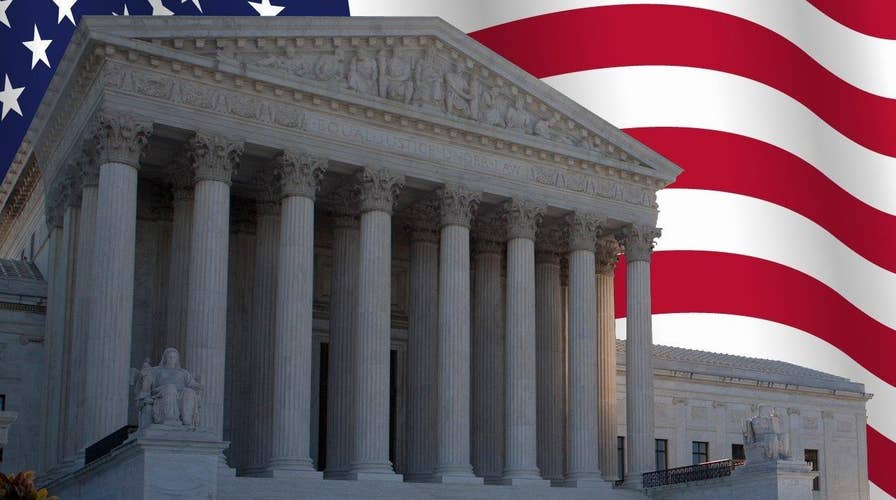The First 100 Days: Trump's Supreme Court
The president-elect's pick could impact the court for decades; Shannon Bream goes in-depth for 'Special Report'
President Thomas Jefferson long ago offered a salient if sour lament about members of the Supreme Court: "They never retire, and they rarely die."
So a vacancy in Washington's most exclusive club is a time for political opportunity and obstacle. It is also something President-elect Donald Trump must confront in his first 100 days in office as he works to replace the late conservative icon Justice Antonin Scalia.
Sources close to the process say the president-elect is getting close to naming a nominee. He said on Fox News' "Hannity" last week that he was "down to probably three or four" candidates and an announcement would come "pretty soon."
"They are terrific people," he added." "Highly respected, brilliant people."
A formal nomination would come after the inauguration. But how successfully Trump and his GOP allies can navigate the confirmation process in the first hectic days of his presidency will depend on how much political air it sucks up, amid other pressing personnel and legislative priorities.
Democrats in the Senate-- where confirmation will take place-- have vowed to strongly oppose anyone who does not meet their definition of a "mainstream" judge.
"We'll give it just a very, very thorough vetting, but we won't ipso facto say no," Charles Schumer, D-NY, the incoming Senate minority leader, told "Fox News Sunday." "If it's out of the mainstream, yes, we're going to fight that nominee tooth and nail."
And conservative voters and activists will be watching.
"All the evangelicals that voted him because of the issue of judges and the Supreme Court are going to be looking with laser focus on this appointment to the Supreme Court," said Kelly Shackelford, president of First Liberty Institute, a law firm focused on defending religious liberty.
The new justice - the country’s 113th - will need to immerse himself or herself in the day-to-day grind of deciding cases big and small, where people of often ordinary means and motives come to argue their case.
People like Gavin Grimm, an extraordinarily bright and poised 17-year-old from Gloucester, Virginia.
The Supreme Court will take up transgender rights for the first time in the case of a school board that wants to keep Grimm from using the boys' bathroom at his high school.
The case is the hottest of the many hot-button issues that will come before the court this term.
The justices-- with either eight or nine members-- will hear this appeal next spring, but the senior, who was born female but identifies as a male, is not able to use the boys' restroom in the meantime.
Grimm is backed by the Obama administration in his argument that the policy violates Title IX, a federal law that bars sex discrimination in schools.
"A personal feeling about someone not liking them for whatever reason is not a basis to kick someone out of the public school life or any aspect of it," Grimm told Fox News’ Chief Legal Correspondent Shannon Bream. "My high school experience has been frankly ruined by this situation."
It is an issue percolating in school districts around the country.
An Illinois group called Students and Parents for Privacy filed a federal lawsuit over the same concerns in Virginia.
Vicki Wilson, a co-founder of the grassroots group, said some students have resorted to wearing their gym clothes underneath their school clothes, so they do not have to disrobe in the locker rooms.
The Obama administration has sued North Carolina over a state law aimed at restricting transgender students to bathrooms that correspond to their biological genders.
A federal judge in Texas has sided with Texas and 12 other states in issuing a nationwide hold on the Obama administration's directive to public schools, issued in May. The directive tells schools to allow transgender students to use the bathroom and locker room consistent with their gender identity.
One concern for the LGBT community: A President Trump could quickly rescind his predecessor's executive order, perhaps making the Grimm appeal moot-- for now.
The transgender petition is just one of several closely-watched cases that could soon reach the newly-configured court. Issues quickly moving up the judicial food chain include campaign finance reform, gun restrictions, voter ID laws, health care reform, abortion access, and more religious freedom disputes.
Activists on both sides of the political aisle know the person in the White House can have a dramatic effect on shaping the entire federal judiciary and the 866 life-tenured judges and justices. Progressives disappointed at Hillary Clinton's loss are comforted by Obama’s success helping restore ideological balance to the federal courts that had been dominated for decades by Republican appointees.
Trump can now shift the benches again, particularly the shaky 4-4 conservative/liberal split on the high court. He told Fox News in late October-- before his victory-- he could possibly get five Supreme Court vacancies to fill.
But the number can be elusive. President Eisenhower was able to appoint five justices; Nixon and Reagan four apiece; Bush 41, Clinton, Bush 43, and Obama each had two. Jimmy Carter got none.
"We're waiting along with the rest of country to see who is nominated," said James Esseks, director of the ACLU's Lesbian Gay Bisexual Transgender and AIDS Project. The group is representing Grimm in his Supreme Court appeal. "Look, I have immense confidence in our judicial system-- and in the ability of justices of whatever background to look at the facts of the case and understand the principles that animate our civil rights laws and to come to a good decision."
Conservatives agree, to some extent, but a "good decision" in their view would one favoring school boards.





